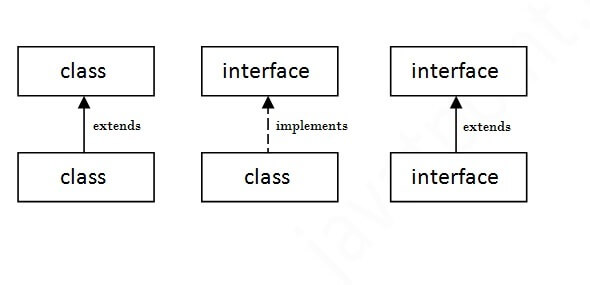tags : Java
An interface in Java is a blueprint of a class. It has static constants and abstract methods. There can be only abstract methods in the Java interface, not method body. It is used to achieve abstraction and multiple inheritance in Java.
Java Interface also represents the IS-A relationship.
- It is used to achieve abstraction.
- By interface, we can support the functionality of multiple inheritance.
- It can be used to achieve loose coupling.
Interface fields are public, static and final by default, and the methods are public and abstract.


Multiple inheritance in Java by interface
If a class implements multiple interfaces, or an interface extends multiple interfaces, it is known as multiple inheritance.

Since Java 8, we can have static methods and default method body in interface.
interface Drawable{
void draw();
default void msg(){System.out.println("default method");}
}What is marker or tagged interface?
An interface which has no member is known as a marker or tagged interface, for example, Serializable, Cloneable, Remote, etc. They are used to provide some essential information to the JVM so that JVM may perform some useful operation.
public interface Serializable{
}| Abstract class | Interface |
|---|---|
| 1) Abstract class can have abstract and non-abstract methods. | Interface can have only abstract methods. Since Java 8, it can have default and static methods also. |
| 2) Abstract class doesn’t support multiple inheritance. | Interface supports multiple inheritance. |
| 3) Abstract class can have final, non-final, static and non-static variables. | Interface has only static and final variables. |
| 4) Abstract class can provide the implementation of interface. | Interface can’t provide the implementation of abstract class. |
| 5) The abstract keyword is used to declare abstract class. | The interface keyword is used to declare interface. |
| 6) An abstract class can extend another Java class and implement multiple Java interfaces. | An interface can extend another Java interface only. |
| 7) An abstract class can be extended using keyword “extends”. | An interface can be implemented using keyword “implements”. |
| 8) A Java abstract class can have class members like private, protected, etc. | Members of a Java interface are public by default. |
| 9)Example: public abstract class Shape{ public abstract void draw(); } | Example: public interface Drawable{ void draw(); } |